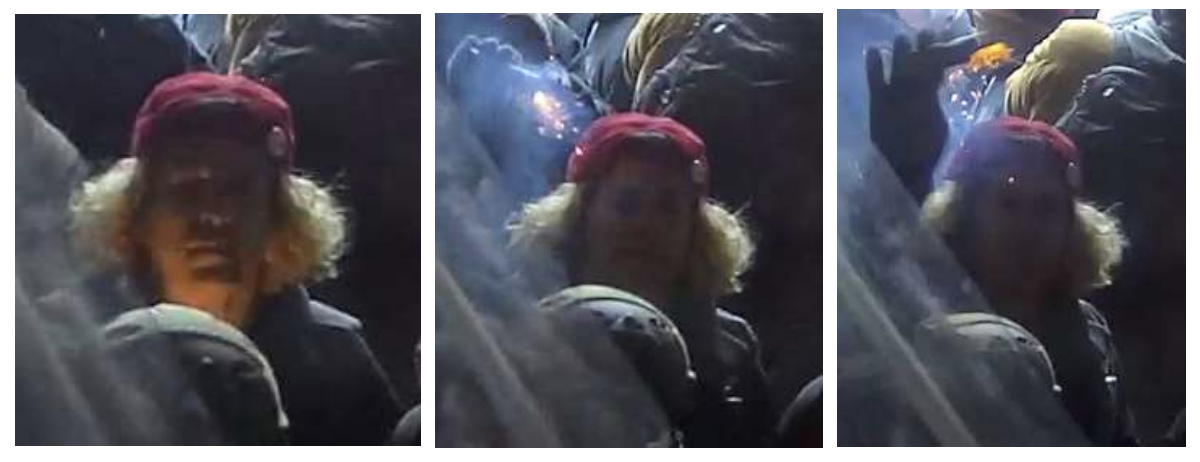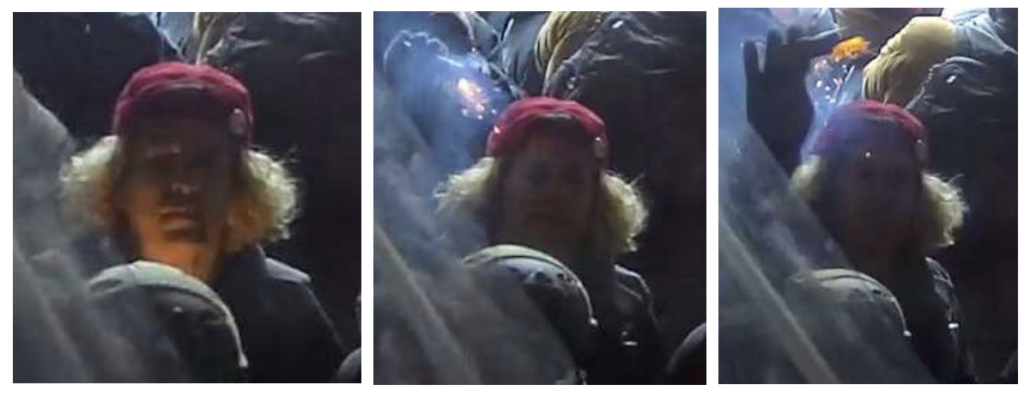David Judd Claims He’s Not Being Treated as Well as the Teenager Who Got Murdered
David Judd is accused of, among other things, throwing a lit firecracker at cops as part of the Tunnel fight on January 6.
He is charged as part of the McCaughey omnibus superseding indictment covering the sustained assault that lasted from 1:08 PM through 4:19 PM with the following charges:
- With Tristan Stevens, attempting to impede an officer from 2:56 to 2:58 PM (Count 16)
- With assault for throwing the firecracker at 3:06 (Count 22)
- With Tristan Stevens, assault involving physical contact from 4:15 to 4:19 PM (Count 33)
- Obstruction, with all his co-defendants (Count 34)
- Civil disorder, with all his co-defendants (Count 35)
- Disorderly conduct with a dangerous weapon on grounds where the Vice President was present (Count 38)
- Engaging in physical violence on grounds where the Vice President was present (Count 46)
- Disorder conduct in a Capitol Building, with all his co-defendants (Count 52)
- Act of physical violence in a Capitol Grounds or Building with all his co-defendants (Count 53)
The government attempted to get Judd held pre-trial. But his attorney Elizabeth Mullin succeeded in getting him released to home detention.
He recently filed the second bid by a January 6 defendant to compel discovery to prove that he is being selectively prosecuted as compared with people arrested in conjunction with Portland riots.
Most of the January 6 defendants were vocal supporters of then-President Donald Trump, a Republican, and were protesting Congress’s certification of Democrat Joseph Biden Jr. as the winner of the November presidential election. Many individuals – though not Mr. Judd – then breached the Capitol building with the intent of interrupting Congress’s certification of the election results. Mr. Judd and the rest of the January 6 defendants are being prosecuted by a Democratic administration.
Based on the charging decisions and outcomes sought by the government in Mr. Judd’s case, Mr. Judd believes he has a colorable claim of selective prosecution when contrasted with the government’s charging and prosecutorial decision-making in violent riots in Portland, Oregon in 2020 as well as at least one D.C. riot case in 2020.
In it, he repeatedly claimed he never entered the Capitol (even though he clearly entered the Tunnel).
Eventually a substantial number – though not Mr. Judd – breached and entered the Capitol building.
[snip]
Mr. Judd never entered the Capitol building, he did not bring any weapons to the Capitol,
And he acknowledges that there is abundant video evidence against him, unlike many of those charged in Portland (which is how DOJ distinguished the last attempt to claim selective prosecution failed — there is simply far more evidence against January 6 defendants).
Of course, much of the evidence against Mr. Judd will be video evidence.
Nevertheless, Trevor McFadden — who in a recent sentencing hearing for Danielle Doyle, claimed that DOJ was treating January 6 defendants differently than last summer’s prosecutors, only to be publicly debunked by the AP — showed great interest in Judd’s claim in a status hearing yesterday, going so far as to explain what Judd needed to do in his reply motion (the government has not yet submitted a response) to succeed.
I’ve barely started examining the table Judd submitted with his motion, which lists slightly more than half — 39 of the 74 — people he says were charged in an attack on the Portland Federal Courthouse; I assume (and hope) prosecutors are doing a far more thorough job, because it’s important for McFadden to understand many public claims about these other riots are false.
Certain problems with Judd’s claims — on top of the evidentiary differences and the fact that rioters were not attempting to stop an event over which the Vice President was present and presiding — are quite clear.
For example, the case that Judd says is most similar, in which Ty Fox is being prosecuted for throwing a firecracker, Fox is being detained pre-trial and prosecuted by the state of Oregon with his federal charges continued pending that case.
On September 23, 2021, I spoke with AUSA Thomas Ratcliffe concerning Mr. Fox. Mr. Ratcliffe is unopposed to a 90-day continuance of this matter. After our call, Mr. Ratcliffe provided me with a copy of a letter outlining a potential resolution of Mr. Fox’s federal case based on the Government’s Petite Policy for successive prosecution.
I met with Mr. Fox on September 24, 2021, at MCDC -Portland, where he is being held on state charges. During our meeting, Mr. Fox authorized the Federal Public Defender to transfer his file to me. His file, and the discovery, should be forthcoming. I will need time to review and analyze the evidence and offense.
A number of the others appear to have been dismissed for evidentiary reasons (that is, precisely the reason why — DOJ argued — that it is easier to prosecute Jan 6 defendants, because there is far better evidence, which Judd as much as concedes by noting the video evidence against him in his filing).
But even more telling, Judd included the other most similar case to his own, in which Isaiah Maza Jr. allegedly took a firecracker during a mob attack on a Federal building and threw it into a the doorway of the courthouse, which injured an officer (who may not have been visible to Maza). Maza was charged with assault as well as damaging a federal building, a crime of terrorism. By including Maza in this table, Judd is arguing that Maza was treated differently than he is being because a Democratic Administration is giving him favorable treatment.
It is true that the charges against Maza were dismissed. But they were dismissed — as Judd himself admits — because Maza died.
What Judd doesn’t admit is that Maza was murdered.
Nineteen-year-old Isaiah Jason Maza Jr. was on a pass from his inpatient alcohol treatment at the Oregon Recovery Center when he was fatally stabbed near his mother’s home Sunday in Northeast Portland.
Maza had been released in September pending trial on federal charges for allegedly tossing an explosive through a broken window of the federal courthouse downtown in July and injuring a deputy U.S. marshal.
His mother, his defense lawyer and even prosecutors said Maza had been doing everything right while on release.
He had a job at Macy’s, was taking his treatment seriously, had applied to Portland State University to continue his education and was fighting to get visitation rights with his young daughter, whose name he had tattooed on his neck.
His mother Renee Maza said she was making dinner Sunday night when her son and his girlfriend wanted to walk to a nearby corner store to buy Takis chips.
“I don’t ever let my kids walk at night here,” Renee Maza said Monday. “It’s a bad area. I usually drive them. But I was cooking and I said to him, ‘There are a lot of thugs out there. You know how I feel about walking.’ He said to me, ‘Mama, I’ll be safe. We are just getting chips. I love you.’’’
Isaiah Maza didn’t get far. He was stabbed around 5:30 p.m. near Northeast 120th Avenue and Couch Street outside an apartment complex next to his mother’s home, according to the teen’s girlfriend and mother.
This is Judd’s argument: that he’s not being treated fairly because he wasn’t doubly charged in violation of federal practice and because he wasn’t murdered before standing trial.
Again, I’ve barely scratched the surface of the cases that Judd claims are similar. But thus far, his argument amounts to claiming that he’s being treated unfairly because another guy got murdered.


